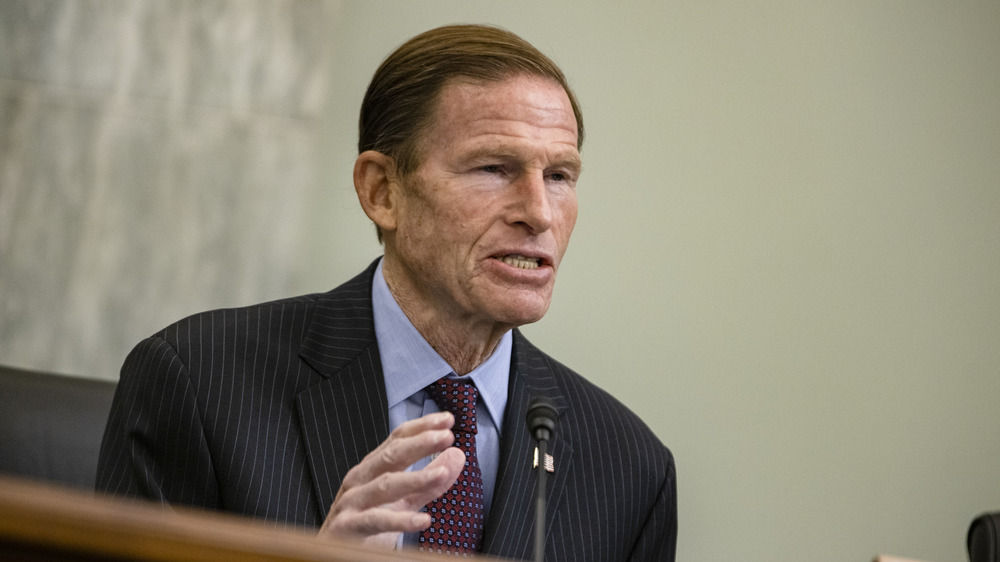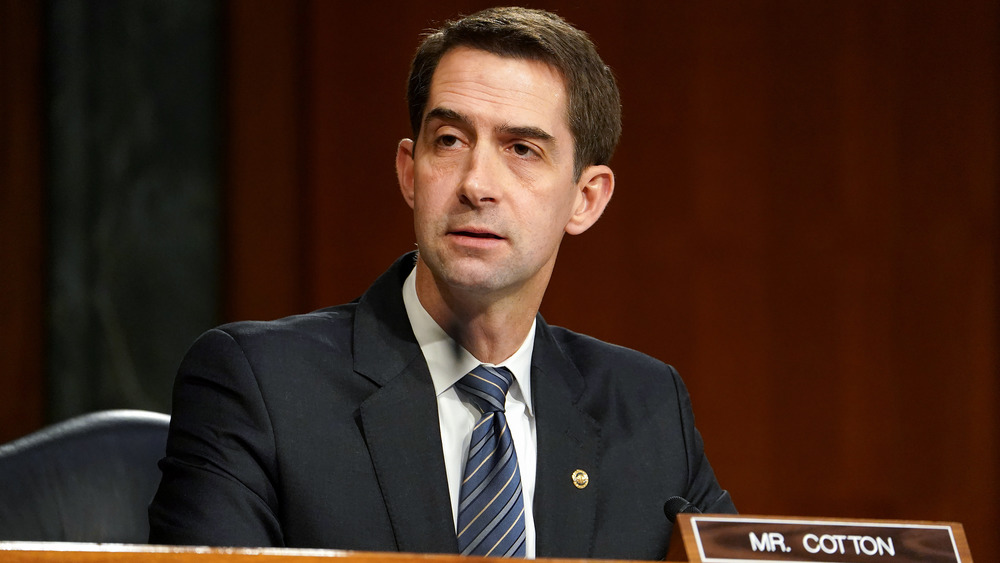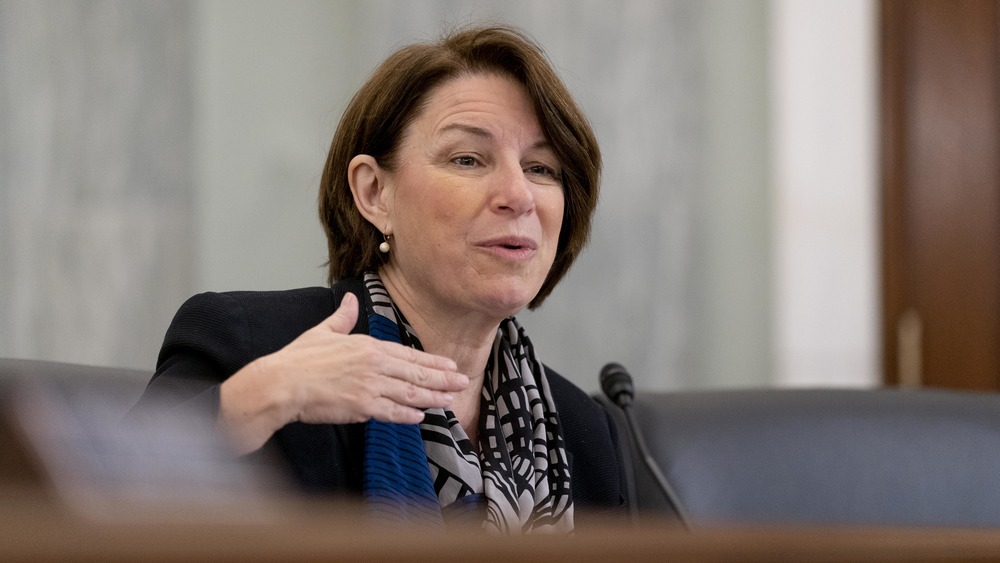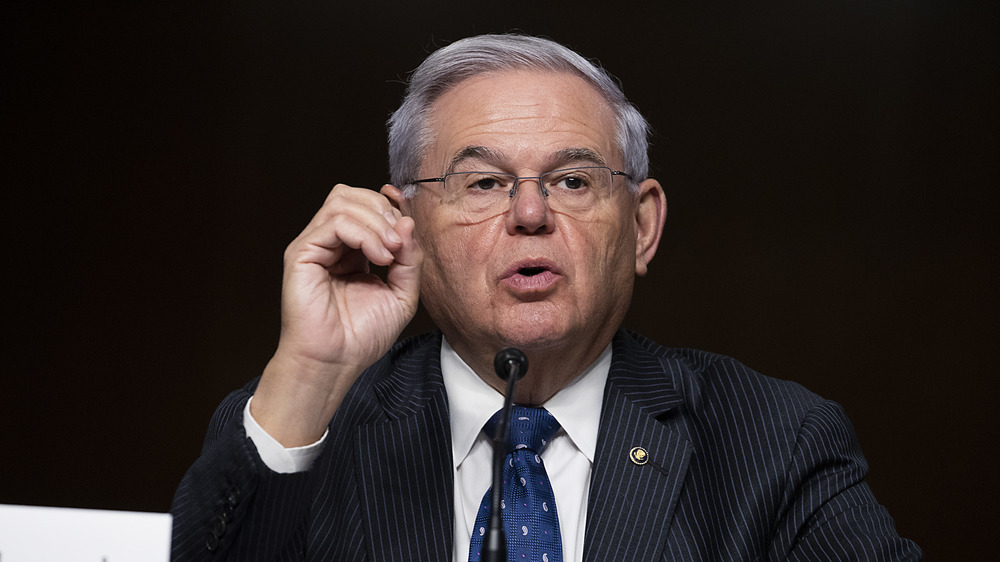The Shady Side Of These United States Senate Members
Politicians are corrupt. Yes and other revelations that can be found here include the fact that water is, in fact, wet, the sun is extremely hot, and oxygen is somewhat important for the human body. If three-quarters of the last century of late-night talk show hosts has taught Americans anything, is that politicians are far from the gold standard of honesty and integrity, regardless of party affiliation or ideological belief.
And here, in this day and age where watching cable news feels more like Capt. Jean-Luc Picard asking for a "damage report" from the USS Enterprise, having to pick a number of corrupt politicians feels like asking to pick fruit at a farmers market. Quantity will not be an issue. Whether it be corruption, illegal investments, pushing policies that would be antithetical to the United States Constitution or the Declaration of Independence, or simply putting their foot in their mouths, these politicians wish that googling their names did not bring up these moments in the search bar. Focusing strictly on the upper chamber of the legislative branch of the United States, or the U.S. Senate to be blunt, here are a number of U.S. senators whose backgrounds they wish to be hidden, buried, and destroyed before their constituents see them come time for re-election.
Kelly Loeffler and David Perdue: Insider trading
Though the careers of Kelly Loeffler and David Perdue in the U.S. Senate drew to a close in January 2021, their careers were put on life support when an investigation of the two Georgia Republican senators was launched for insider trading while members of the Senate. That tends to happen when your'e two of the wealthiest individuals on Capitol Hill already and are potentially using inside information gained to enrich one's bank accounts when the rest of the nation struggles in the midst of a global pandemic and recession.
The Loeffler scandal was broken originally by The Daily Beast right before the beginning of the coronavirus in the U.S. and the subsequent nationwide shutdowns. According to Reuters, Loeffler and her husband, Jeff Sprecher, who is the chairman of the company that owns the New York Stock Exchange, sold millions of dollars worth of stocks between late January to early February 2020. The investigation began because Loeffler participated in private COVID meetings in the Senate, and some of her stocks sold was directly affected by the outbreak, leading many to believe she participated in trading using insider knowledge.
The New York Times reported that Perdue was being investigated by the Justice Department in November 2020 for insider trading. During the investigation, it was found that Perdue had made 2,596 trades while in the Senate, roughly equal to the next five senators combined! While cleared, the scandals led to their defeats in Georgia's runoff election.
Richard Blumenthal: Service in the military
Many members of Congress today have served in the U.S. army. Sen. Richard Blumenthal is one of those congressmen. However, his service was very different compared with former senators like John Kennedy, John McCain, and John Kerry. Originally reported by the The New York Times, Blumenthal had received five deferments between 1965-70 to avoid active combat in Vietnam. According to the Hartford Courant, the Connecticut Democrat had made multiple references throughout his career of having served on the ground in Vietnam. However, Blumenthal's record found that, while he served in the U.S. Marine Corps Reserve from 1970-76, he never left the states.
In 2003, he gave his support towards troops overseas and told about 100 military families, "when we returned, we saw nothing like this." Other times, he led his audience to believe he served on the front lines, though never explicitly providing details of his service.
President Donald Trump jumped on this fact by berating his opponent in the senate. According to CNBC, Trump referred to Blumenthal as "Da Nang Dick" and as "a third rate Senator" on Twitter during his visit to Vietnam in 2019. Trump, ironically, had also received five deferments, the same number as Blumenthal, to avoid combat in Vietnam between 1964-72. The senator has since had to walk back his service or lack of service, saying he had "misspoken" on a number of occasions when describing his experience in the U.S. Army.
Cindy Hyde-Smith: Racism
Upon winning her senatorial election in 2018, ThinkProgress congratulated Mississippi senator Cindy Hyde-Smith with the title, "most racist member of the U.S. Senate." While much can be debated on which senator deserves the title, much can be said about Hyde-Smith's record, comments, and even upbringing that places her in competition with the 99 other members.
Less than three weeks before her election against Democrat Mike Espy, who is African American, a video was posted on Twitter where Smith was talking to one of her supporters, saying, "if he invited me to a public hanging, I'd be in the front row." Between 1882-1968, Mississippi led the nation in public lynchings, according to the Atlanta Black Star, the most infamous being of Emmitt Till, a 14-year-old Black child visiting from the north in 1955 and whose murder helped spark the Civil Rights Movement.
Hyde-Smith at first ignored the criticism then apologized at her debate with Espy, though she walked it back moments later accusing his campaign of using her words as "a political weapon," NPR reports. During this same time, Hyde-Smith said that efforts to suppress voters were "a great idea." Still, Hyde-Smith's record of racism goes even further back. Following integration, many white southerners set up "segregation academies," private schools established as a way to keep schools from integrating. Hyde-Smith attended one of these academies, Lawrence County Academy, and sent her daughter to one as well, Brookhaven Academy, according to NBC News.
Tom Cotton: Comments during George Floyd protest
Speaking of putting one's foot in their mouth when it comes to racial division, Sen. Tom Cotton is a man whose literal name is the "cash crop" that led to the growth of slavery in the U.S. The year 2020 was a landmark year in terms of race relations in the nation. It was a time for reflection and tough discussion, especially following the murders of George Floyd and Breonna Taylor. Cotton put himself in the center of the hurricane by penning a New York Times article promoting and defending the idea of sending the U.S. military to break up protests that do not stay pacifist, using the phrase "no quarter," which means to kill lawfully surrendering combatants.
This was far from the only comment Cotton made during the protest. Cotton compared protestors to southern successionists who sought to preserve the institution of slavery. A critic of the New York Times Magazine 1619 Project, which sought to use the introduction of slavery and the effects of their ancestors as the center of U.S. history, Cotton said this of the institution of slavery in the U.S. "As the Founding Fathers said, it was the necessary evil upon which the union was built."
Unsurprisingly, the comments were incredibly divisive and met with swift reactions. According to the BBC, Cotton defended his comments while on the floor of the Senate, introducing the "Saving American History Act," which sought to cut funding for the 1619 Project, which he referred to as "left-wing propaganda."
Chuck Schumer: Israel Anti-Boycott Act
As illustrated by this 2014 clip of The Daily Show with Jon Stewart, any discussion of Israel and Palestine can get messy. But what is far less messy and controversial is the First Amendment. Freedom of speech is an idea that is generally agreed upon as being necessary for a free society, making Senate Majority leader Chuck Schumer's backing of a bill, that according to the ACLU, would criminalize any party or company boycotts against Israel, disturbing to First Amendment absolutists.
According to the Jewish News Syndicate, the bill was first introduced by Sens. Ben Cardin and Rob Portman in March 2019 but stalled in the House of Representatives from Democratic opposition. Earlier that year, then-Senate minority leader Schumer and a bipartisan group of senators passed a legislative package allowing states and local government the power to punish contractors who supported the Boycott, Divestment, and Sanction, or BDS movement. The movement promotes their three stated points against Israel over their treatment of Palestinians in the area.
According to New York Magazine, Israel, against international law, has continued to occupy and annex territory the UN had granted to Palestine, and the nation has drawn comparisons to the apartheid government of South Africa. While some reports indicate that lawmakers signed the bill on political pressure, Schumer has long been a supporter of Israel, even opposing his party's leader, President Barack Obama, at times, and supporting Republican President Donald Trump's decision to move the U.S. Embassy to Jerusalem.
Amy Klobuchar: Treatment of her staff and prosecution record
While the George Floyd murder and ensuing movement happened in Sen. Amy Klobuchar's state of Minnesota, this was not her first controversy. In 2019, Klobuchar was hoping to become the Democratic presidential candidate. However, her presidential run ran awry once people began to look at her record as both a senator and a prosecutor.
The New York Times reported that Klobuchar had treated her aides so poorly, she had one of the highest employee turnovers in the Congress. According to her aides and witnesses, this included berating her aides over minor infractions, throwing items in their direction in frustration, and telling them to clean her dishes. In Vanity Fair, aides have compared her to President Donald Trump. In defending herself, Klobuchar has said she had "high expectations" and that she has made mistakes at times.
While damaging, Klobuchar still maintained a slim chance as the 2020 Democratic vice president nomination for candidate Joe Biden. That went out the door when her record as the attorney in Hennepin County in Minneapolis came to light following the murder of Floyd. According to KUTV, officer Derick Chauvin, the officer who kneeled on Floyd's neck, killing him, was accused of shooting a man in October 2006, when Klobuchar was the county's attorney. Klobuchar's office refused to prosecute the officer, and an investigation found that while the county's attorney, she refused to bring charges against more than two dozen fatal shootings by officers.
Kamala Harris: Criminal justice record
Speaking of prosecutors who have a controversial record and were one-time Democratic hopefuls for the presidency, enter Sen. Kamala Harris. Or vice president Kamala Harris at this point. Still, her presidential prospects ended a lot sooner than fellow Sen. Amy Klobuchar as Harris ran into a wall of controversy when her record was analyzed. For example, despite being strongly opposed to Donald Trump and his cabinet, Harris was questioned about her decision to not prosecute future U.S. Secretary of the Treasury Steve Mnuchin, who eventually donated money to her campaign, as reported by the Huffington Post.
"Kamala is a cop" meme popped up during her 2020 presidential campaign because of her record. Congresswoman Tulsi Gabbard criticized Harris for her record at a Democratic debate. In 2014, federal judges ordered California to release nonviolent second-strike offenders to be eligible for parole after serving half their sentence. This was in order to cut down on inhuman prisoner treatment because of overpopulation. Many of the offenders were working jobs, and Harris' lawyers argued to release them would reduce their prison labor force, according to Marie Claire. Their case failed and, according to Harris, she was "shocked" to hear her lawyer's defense.
Harris, in an attempt to curb truant students in her district, made it a misdemeanor for parents if their child missed 10% of school days unexcused, which could lead to jail time. Like the episode with the prison labor, Harris had to walk back her stance.
Richard Burr: Insider trading
Oh look, another senator accused of insider trading. Who would have thought that when someone has money in the stock market, that they might use the inside knowledge they have access to in order to increase their bank account... allegedly. According to Politico, the FBI announced they were investigating the North Carolina conservative senator, Richard Burr, who was forced to surrender his cellphone and lose his chairperson position in the Senate.
Mirroring the Loeffler and Perdue scandal, Burr was found to be selling off stocks right before the economy and certain stocks crashed because of the COVID pandemic shutdowns. The difference between the two Georgia senators and Burr is that Burr was the chair of the Senate Intelligence Committee. According to Vox, the same time he was selling off stocks, he had written an op-ed for the public ensuring that the government was prepared for the virus, and the economy was stable. That May, the FBI served Burr a search warrant on his D.C. residence and seized his cellphone as a part of an investigation, the The Los Angeles Times reports. Less than 24 hours later, Burr stepped down as the chairperson of the committee.
Burr was just one of many senators who were caught up in this scandal, along with the Georgia senators, Dianne Feinstein (D-Calif.) was also questioned for her trading during this period, though Feinstein said her questions were "basic" and did not require any warrants like Burr. CNN reported the investigation closed in January 2021.
Josh Hawley: Home address
The year 2021 has been a tough for Sen, Josh Hawley. Hawley has been met with calls for his removal following his support of the "Stop the Steal" campaign and appearing at the rally that ended in the violent storming of the U.S. Capitol. That same week, he accused "Antifa scumbags" of attacking his home and threatening his family. According to the Chicago Tribune, officers at the scene denied this summary. This was not the first time Hawley's home hit headlines.
In his first speech on the Senate floor in 2019, Hawley lambasted Congress for coastal bias, accusing them of believing "everyone else is pathetic or backward. And millions of Americans are left with the sense that the people who run this country view them with nothing but contempt and value them as nothing but consumers."
According to The Kansas City Star, Hawley seemed to have joined those he criticized. Despite being a Missouri senator, Hawley does not own a home in the state, as property records show he used his sister's Ozark, Mo., address as his address when voting. He and his family instead live in a $1.3 million home in Northern Virginia, close to D.C.
The Missourian stated that in 2018, Hawley frequently attacked his opponent, Claire McCaskill, for not spending enough time in their state. Following the story, Hawley's office claimed that they were staying with their family until they built a new home and attacked The Kansas City Star for being a failing newspaper.
Rick Scott: Investments
Rick Scott is another senator accused of using his position to enrich himself. At this point, senators making side deals and using their positions to earn a buck is as common as American flag and Mitch McConnell turtle jokes. However, unlike the other senators on the list, Scott's bank account has been in the headlines multiple times throughout his run as a governor and senator, and it probably will continue to be the story long after he leaves Washington.
In July 2018, then-Florida governor Scott came under suspicion after federal financial disclosed forms illustrated that investments in Scott's blind trust, which was set up to avoid conflicts of interest and that he should have no part of, mirrored investments made by his wife. According to Politico, the individuals who are in charge of the trust worked and were very close to the Scotts. Larry Noble, senior director and general counsel for the Campaign Legal Center, said, "It's hard to think of Gov. Scott's blind trust as an effective barrier to potential conflicts of interest when the investments in the trust mirror his family's investments.
During the same period, Maplight reports, it came out that Scott had invested $18 million into three firms managing money for the state pension, something Scott had direct control over. According to The Tampa Bay Times, despite being a critic of both the Putin regime in Russia and the Maduro regime in Venezuela, Scott had investments in companies in both countries.
Bob Menendez: Corruption
In an unsurprising turn of events, another senator, Bob Menendez of New Jersey, was investigated for abusing his position to enrich himself. However, in a surprising turn of events, the backlash for the senator was bipartisan. According to CNN, the Senate Select Committee on Ethics, made up of three Democrats and three Republicans, said following an investigation that Menendez's actions had "violated Senate Rules, federal law, and applicable standards of conduct."
According to the Department of Justice, Menendez had accepted about $1 million in gifts and campaign contributions from his close friend, Salomon Melgen, a Florida ophthalmologist, in exchange for Menendez to use his power to "influence the outcome of ongoing contractual and Medicare billing disputes worth tens of millions of dollars to Melgen" and sponsor visas for several of Melgen's girlfriends. From his many gifts, including flights to Latin American and Europe, the senator never disclosed them on his financial disclosure forms.
In March 2019, Menendez and Melgen were indicted on 14 counts — one count of conspiracy, one count of violating the travel act, eight counts of bribery, three counts of honest services fraud, and one count of making false statements, according to NJ.com. While that trial ended in a mistrial, Melgen was sentenced to 17 years in prison in a separate federal case of 67 crimes that included health care fraud, submitting false claims, and falsifying records in patients' files, as reported by North Jersey. President Donald Trump commuted his sentence in January 2021.











